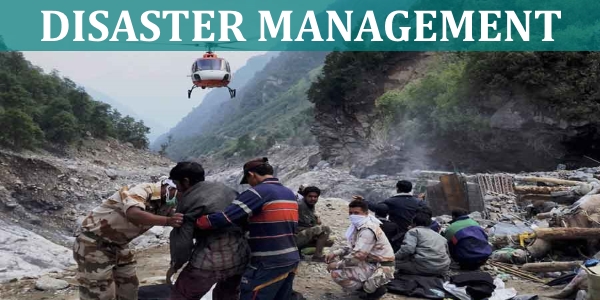

Disaster Management - Courses, Colleges, Online Programs and Careers
Naief Khatri

Every natural disaster creates havoc and brings huge losses to the economy. With global warming, disasters seem to be getting more common, necessitating the need for Disaster Management, which helps create a structured plan to cope with the event and bring about normalcy. Because of its increasing importance, today Disaster Management is being offered as an MBA degree as well.
Students who pursue an MBA degree in Disaster Management learn skills, both in research and technical fields, as well as get management expertise to handle such situations effectively. While Disaster Management helps cope with a disaster, it involves strategizing and implementing plans and strategies before any impending disaster, such that losses can be prevented or made minimal as well. So, this degree creates sharp-minded professionals who develop the eye to spot impending failures or calamities and they are thus well-trained to handle such situations with their organizational skills.
Course Details
Some of the topics that students cover in this MBA course are,
Strategic Management
Human Resource Management
Disaster Management
Risk Assessment
Financial Statement Analysis
Marketing Management
Research Methods
Business Continuity Management
Management of Urban Disasters
Students of this course will generally learn about how Disaster Management is hugely dependent on factors such as the climate of a place, local economic conditions, and the population of a place or those being/likely to be affected by the disaster, as well as whether the disaster is man-made or natural.
Careers
Career opportunities for disaster management professionals mainly exist in government sector with emergency services, relief groups, law enforcement department, and local authorities. Opportunities also exist with private agencies and non profit organizations dealing with disaster management services. International agencies like United Nations also appoint disaster management professionals. These professionals are appointed in different capacities, viz, trainees, assistants, experts, researchers, analysts, engineers, medical health experts, environmental experts, rehabilitation workers etc.
In the past, it was mostly been military personnel or first responders who had handled disasters and managed them. But today, professionals, especially those interested in areas such as social welfare or community development, pursue this field. These MBA students can find employment in various fields such as fire departments, law enforcement, drought management departments, and so on. They can also begin their own consultancies as a career. Sometimes, certain organizations may have their own disaster management units. Examples include insurance companies, petroleum industry, chemical industry, and mining industry.
Top Colleges/Institutes for Disaster Management
College/Institute
Guru Gobind Singh Indraprastha University - New Delhi
College/Institute
Anna University - Chennai
College/Institute
IASE University - Rajasthan
College/Institute
Indira Gandhi National Open University (IGNOU) - New Delhi
College/Institute
The Global Open University - Nagaland
College/Institute
Tata Institute of Social Sciences - Mumbai
College/Institute
MS University - Vadodara
College/Institute
Devi Ahilya University - Indore
College/Institute
Indian Institute of Ecology and Environment (IIEE) - New Delhi
College/Institute
Sikkim Manipal University - Gangtok
College/Institute
Nalanda Open University - Patna
College/Institute
National Institute of Disaster Management - New Delhi
College/Institute
Disaster Management Institute - Bhopal
College/Institute
Disaster Mitigation and Management Centre - Dehradun
College/Institute
Geological Survey of India - Kolkata
College/Institute
National Civil Defence College - Nagpur
College/Institute
National Information Centre of Earthquake Engineering IIT Kanpur
College/Institute
Alagappa University - Chennai
Other MBA specializations in India
- Human Resource (HR) Management
- Finance Management
- Telecom Management
- Retail Management
- Textile Management
- Sports Management
- Tourism Management
- IT Management
- Infrastructure and Real Estate Management
- MBA (Entrepreneurship)
- Supply Chain Management
- Marketing Management
- Hospital Management
- Facility Management
- Fashion Management
- Healthcare Management
- Communication Management
Related Links
Latest News
People Reading Now

CBSE Compartment Result 2023 OUT: Click For Direct Link



CSAB 2023: Special Round Registration Begins Today


